#and Chinese revolutions
Text
I fucking love hearing how people say that fighting for freedom is useless and any revolution is bad. (because people die wow) (and without revolution everything would've been sooooooo good) (white supremacy moment I guess)
#soviet revolution were bad btw#and Irish fight for freedom#and Chinese revolutions#and USA war of independence#and south African anti apartheid movement#and Palestinian struggle and fight against Israel#and every revolution and anti colonialism movement and anti imperialsm movement were and are so so bad#why can't they just suffer in silence((((#free palestine#palestine#irish#anti zionisim#idk how to tag sorry
5 notes
·
View notes
Text
[Hanfu · 漢服]The relationship between women in history is not just love rivals,
“but also thousands of years later, everyone knows that it is me and you.”
Let's get to know about them/她们 in China history.
1.【Han Dynasty】:Princess Jieyou (解忧公主) & Feng Liao (馮嫽)
Princess Jieyou (Chinese: 解忧公主; 121 BC – 49 BC), born Liu Jieyou (Chinese: 刘解忧), was a Chinese princess sent to marry the leader of the Wusun kingdom as part of the Western Han Chinese policy of heqin(和亲).
As the granddaughter of the disgraced Prince Liu Wu (劉戊) who had taken part in the disastrous Rebellion of the Seven States,her status was low enough that she was sent to replace Princess Liu Xijun (劉細君) after her untimely death and marry the Wusun king Cunzhou (岑陬).
Jieyou lived among the Wusun for fifty years and did much work to foster relations between the surrounding kingdoms and the Han. She was particularly reliant upon her attendant, Feng Liao, whom she dispatched as an emissary to Wusun kingdoms and even to the Han Court. She faced opposition from pro-Xiongnu members of the Wusun royalty, particularly Wengguimi’s Xiongnu wife. When word came that the Xiongnu planned to attack Wusun, she convinced her husband to send for aid from the Han Emperor. Emperor Wu of Han sent 150,000 cavalrymen to support the Wusun forces and drive back the Xiongnu.
In 51 BCE at the age of 70, Jieyou asked to be allowed to retire and return to the Han. Emperor Xuan of Han agreed and had her escorted back to Chang'an where she was welcomed with honor. She was given a grand palace with servants usually reserved for princesses of the imperial family. In 49 BCE, Jieyou died peacefully.
Feng Liao (馮嫽)
Feng Liao (馮嫽) was China's first official female diplomat,[citation needed] who represented the Han dynasty to Wusun (烏孫), which was in the Western Regions. It was a practice for the Imperial Court to foster alliances with the northern tribes via marriage, and two Han princesses had married Wusun kings.
Feng Liao was the maidservant of Princess Jieyou (解憂公主), who was married off to a Wusun king. Feng herself later married an influential Wusun general, whose good standing with Prince Wujiutu (烏就屠) of the kingdom later proved beneficial to the Han dynasty.
When Prince Wujiutu seized the throne of Wusun in 64 BC, after his father died, there was fear in the Imperial Court of Han that Wujiutu, whose mother was Xiongnu, would allow Wusun to become Xiongnu's vassal.
Zheng Ji, Governor of the Western Regions, recalled that Feng Liao had married into Wusun and with her familiarity of the Wusun customs, she was a prime candidate to persuade Wujiutu to ally his kingdom with Han. Wujiutu acceded and Emperor Xuan of Han (漢宣帝) sent for Feng. He praised her for her judgement and diplomacy, and appointed her as the official envoy to Wusun.
Wujiutu was conferred the title "Little King of Wusun" while his brother, the son by a Han princess, was named "Great King of Wusun". Wusun was divided between the two kings and tensions in that region were eased.
※Xiongnu: Xiongnu: A nomadic tribe that has occupied northern China for a long time. Later it gradually became a state. It harassed the borders of the Han Dynasty for a long time and robbed supplies.
------
With their efforts, the Wusun Kingdom gradually tended to support the Han Dynasty, and the Xiongnu's defeat in China also began.
------
2.【Tang Dynasty】:Shangguan Wan'er(上官婉儿)&Princess Taiping (太平公主)
Shangguan Wan'er/上官婉儿 (664 – 21 July 710) was a Chinese politician, poet, and imperial consort of the Wu Zhou and Tang dynasties. Described as a "female prime minister,"Shangguan rose from modest origins as a palace servant to become secretary and leading advisor to Empress Wu Zetian of Zhou. Under Empress Wu, Shangguan exercised responsibility for drafting imperial edicts and earned approbation for her writing style. She retained her influence as consort to Wu's son and successor, Emperor Zhongzong of Tang, holding the imperial consort rank of Zhaorong (昭容). Shangguan was also highly esteemed for her talent as a poet.Shangguan was also highly esteemed for her talent as a poet. In 710, after Emperor Zhongzong's death, Shangguan was killed during a palace coup that ended the regency of Empress Dowager Wei.
Princess Taiping (太平公主)lit. "Princess of Great Peace", personal name unknown, possibly Li Lingyue (李令月) (after 662 – 2 August 713) was a royal princess and prominent political figure of the Tang dynasty and her mother Wu Zetian's Zhou dynasty. She was the youngest daughter of Wu Zetian and Emperor Gaozong and was influential during the reigns of her mother and her elder brothers Emperor Zhongzong and Emperor Ruizong (both of whom reigned twice), particularly during Emperor Ruizong's second reign, when for three years until her death, she was the real power behind the throne.
She is the most famous and influential princess of the Tang dynasty and possibly in the whole history of China thanks to her power, ability and ambition. She was involved in political difficulties and developments during the reigns of her mother and brothers. Indeed, after the coup against Empress Dowager Wei, she became the real ruler of Tang. During the reign of Emperor Ruizong, she was not restricted by anything, the emperor issued rulings based on her views and the courtiers and the military flattered her and majority from every civil and military class joined her faction, so her power exceeded that of the emperor.
Eventually, however, a rivalry developed between her and her nephew, Emperor Ruizong's son, Crown Prince Li Longji. Both of them were hostile in power-sharing and they fought for the monopoly over power. After Emperor Ruizong yielded the throne to Li Longji (as Emperor Xuanzong) in 712, the conflict came to the political forefront, and openly, the court became a manifestation of conspiracy rather than the administration of the empire; in 713, Emperor Xuanzong, according to historical records, believing that she was planning to overthrow him, acted first, executing a large number of her powerful allies and forcing her to commit suicide.
------
The relationship between Shangguan Wan'er and Princess Taiping has always been written as "enemies" in official history, but with the phrase "千年万岁,椒花颂声", their friendship that has been buried for thousands of years was revealed.
The"千年万岁,椒花颂声" sentence comes from the epitaph written by Princess Taiping for Shangguan Wan'er. The original text is: "潇湘水断,宛委山倾,珠沉圆折,玉碎连城。甫瞻松槚,静听坟茔,千年万岁,椒花颂声”
Translation: Now that you are far away, the sky and the earth will lose their color. I'm afraid that all I can do in the future is to sit and look at the tea tree in front of your tomb. Maybe I can hear your voice again when I stand within an inch of the tomb. But this is a delusion after all, a quiet tomb, no beautiful face, a empty place of death. I hope that in a thousand or ten thousand years, there will still be people like me who remember you.
------
3.【Late Qing Dynasty】:Lü Bicheng(呂碧城) & Qiu Jin (秋瑾)
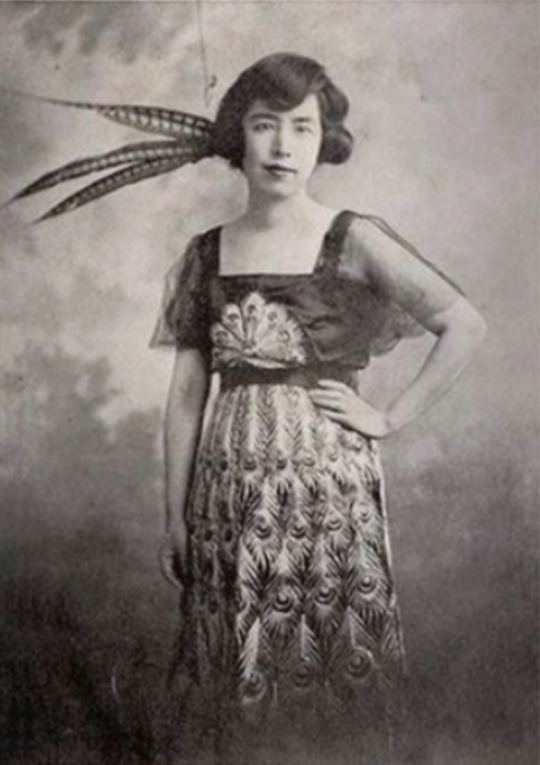
Lü Bicheng(呂碧城)also known as Alice Pichen Lee(1883–1943) was a Chinese writer, activist, newspaper editor, poet and school founder. She has been mentioned as one of the top four women in literature from the early Republic of China.
When she was four, her father retired to Lu'an, Anhui. She lived a life of comfort until the age of 12, when her father died in 1895. Because Lü Fengqi had no male heir, relatives of the Lü lineage contested for his inheritance, and Yan Shiyu and her four daughters were forced to move to Lai'an County to live with her natal family. When she was nine, Lü Bicheng was betrothed to a Wang family, but as her own family fortune declined, the Wang family broke off the marriage contract, giving the young Bicheng the stigma of a "rejected woman". The resulting emotional scar is often considered a major factor in her later decision to never marry.[8] Her widowed mother and the Lü girls were not well treated at the Yan family in rural Anhui. When Lü was 15 or 16, Yan Shiyu sent her to live with her maternal uncle Yan Langxuan (嚴朗軒), who was the salt administrator in Tanggu, the port city outside the northern metropolis of Tianjin. Her sister Huiru also joined her later.
During her stay in Tanggu, Qing China went through the tumultuous period of the failed Hundred Days' Reform of 1898, which brought about increasing awareness of women's education, and the Boxer Rebellion of 1900. In 1904, Mrs. Fang, the wife of her uncle's secretary, invited Lü Bicheng to visit a girls' school in Tianjin, but her uncle prevented her from going and severely reprimanded her. The next day, she ran away from her uncle's home, and took the train to Tianjin with no money or luggage. She wrote a letter to Mrs. Fang, who was staying at the dormitory of the Ta Kung Pao newspaper. Ying Lianzhi, the Catholic Manchu nobleman who founded the newspaper, read the letter and was so impressed by it that he made her an assistant editor. Lü Bicheng wrote a "progressive" ci that she had previously written, set to "A River Full of Red" ("Manjianghong") usually used to express heroic emotions. Ying transcribed the whole song in her diary and published it in L'impartial two days later. At the time, it was sensational for a woman to write for an influential national newspaper such as Ta Kung Pao. She was 21 years old. She used Ta Kung Pao to promote feminism and became a well-known figure.
Lü's ci poetry was published in the newspaper and it was very well received. She was the chief editor of the newspaper from 1904 to 1908. In 1904 she decided to improve education for girls. She had published her thoughts on women's rights and the general editor of the newspaper introduced her to Yan Fu who was an advocate for Western ideas. The Beiyang Women's Normal School was established that same year. At 23 Lü took on the job of principal of the school she had founded two years before. At first this school found it difficult to find girls who qualified for secondary education and students were brought in from Shanghai to make up the numbers.
Lü knew the revolutionary Qiu Jin and they had similar objectives but Lü did not join her in Japan when she was invited as she was unsure whether women should meddle in politics. She was then chosen to be secretary to Yuan Shikai, one of the most powerful people in China. When he set out to declare himself emperor of China she left, like many of his followers, and abandoned him.
--

Qiu Jin (秋瑾)8 November 1875 – 15 July 1907,was a Chinese revolutionary, feminist, and writer.Her sobriquet name is Jianhu Nüxia (Chinese: 鑑湖女俠 lit. 'Woman Knight of Mirror Lake').
Qiu was born into a wealthy family. Her grandfather worked in the Xiamen city government and was responsible for the city's defense. Zhejiang province was famous for female education, and Qiu Jin had support from her family when she was young to pursue her educational interests. Her father, Qiu Shounan, was a government official and her mother came from a distinguished literati-official family. Qiu Jin's wealthy and educated background, along with her early exposure to political ideologies were key factors in her transformation to becoming a female pioneer for the woman's liberation movement and the republican revolution in China.
In the early 1900s, Japan had started to experience western influences earlier than China. As to not fall behind, the Qing government sent many elites to learn from the Japanese. Qiu Jin was one of these elites that got the chance to study overseas. After studying in a women's school in Japan, Qiu returned to China to participate in a variety of revolutionary activities; and through her involvement with these activities, it became clear how Qiu wanted others to perceive her. Qiu called herself 'Female Knight-Errant of Jian Lake' — the role of the knight-errant, established in the Han dynasty, was a prototypically male figure known for swordsmanship, bravery, faithfulness, and self-sacrifice — and 'Vying for Heroism'
Qiu Jin had her feet bound and began writing poetry at an early age. With the support from her family, Qiu Jin also learned how to ride a horse, use a sword, and drink wine—activities that usually only men were permitted to learn at the time.In 1896 Qiu Jin got married. At the time she was only 21, which was considered late for a woman of that time. Qiu Jin's father arranged her marriage to Wang Tingchun, the youngest son of a wealthy merchant in Hunan province. Qiu Jin did not get along well with her husband, as her husband only cared about enjoying himself.While in an unhappy marriage, Qiu came into contact with new ideas. The failure of her marriage affected her decisions later on, including choosing to study in Japan.
While still in Tokyo, Qiu single-handedly edited a journal, Vernacular Journal (Baihua Bao). A number of issues were published using vernacular Chinese as a medium of revolutionary propaganda. In one issue, Qiu wrote A Respectful Proclamation to China's 200 Million Women Comrades, a manifesto within which she lamented the problems caused by bound feet and oppressive marriages. Having suffered from both ordeals herself, Qiu explained her experience in the manifesto and received an overwhelmingly sympathetic response from her readers. Also outlined in the manifesto was Qiu's belief that a better future for women lay under a Western-type government instead of the Qing government that was in power at the time. She joined forces with her cousin Xu Xilin and together they worked to unite many secret revolutionary societies to work together for the overthrow of the Qing dynasty.
Between 1905 and 1907, Qiu Jin was also writing a novel called Stones of the Jingwei Bird in traditional ballad form, a type of literature often composed by women for women audiences. The novel describes the relationship between five wealthy women who decide to flee their families and the arranged marriages awaiting them in order to study and join revolutionary activities in Tokyo. Titles for the later uncompleted chapters suggest that the women will go on to talk about “education, manufacturing, military activities, speechmaking, and direct political action, eventually overthrowing the Qing dynasty and establishing a republic” — all of which were subject matters that Qiu either participated in or advocated for.
Life after returning to China
Qiu Jin was known as an eloquent orator who spoke out for women's rights, such as the freedom to marry, freedom of education, and abolishment of the practice of foot binding. In 1906 she founded China Women's News (Zhongguo nü bao), a radical women's journal with another female poet, Xu Zihua in Shanghai. They published only two issues before it was closed by the authorities. In 1907, she became head of the Datong school in Shaoxing, ostensibly a school for sport teachers, but really intended for the military training of revolutionaries[citation needed]. While teaching in Datong school, she kept secret connection with local underground organization—The Restoration Society. This organization aimed to overthrow the Manchu government and restore Chinese rule.
Death
In 1907, Xu Xilin, Qiu’s friend and the Datong school’s co-founder was executed for attempting to assassinate his Manchu superior. In the same year, the authorities arrested Qiu at the school for girls where she was the principal. She was tortured but refused to admit her involvement in the plot. Instead the authorities used her own writings as incrimination against her and, a few days later, she was publicly beheaded in her home village, Shanyin, at the age of 31. Her last written words, her death poem, uses the literal meaning of her name, Autumn Gem, to lament of the failed revolution that she would never see take place:
秋風秋雨愁煞人
(Autumn wind, autumn rain — they make one die of sorrow)
After Qiu Jin was killed, no one dared to collect her body. Lu Bicheng endured her grief and took great risks to bury her friend. The guarding Qing army learned that the woman who came to collect the corpse was Lu Bicheng, who was famous in China, and they had no choice but to do anything.
Qiu Jin's death caused Lu Bicheng to lose a rare confidant in life. She wrote many poems in memory of Qiu Jin, recalling this like-minded friend.
Later, Lü Bicheng wrote "The Biography of the Revolutionary Heroine Qiu Jin" in English, which was published in newspapers in New York, Chicago and other places in the United States. It caused a great response and not only made many people in the world know about Qiu Jin's legendary story, but also published it in newspapers in New York and Chicago. It also makes people understand the darkness and corrupt social status quo of the Qing Dynasty. Lu Bicheng used a pen of her own to record her friendship with Qiu Jin, and also fulfilled her promise to Qiu Jin to respond with the "battle of words"
————————
📸Video & 🧚🏻 Model:@荷里寒 & @阿时Ashi_
🔗Weibo:https://weibo.com/3618951560/NEZZnpQRq
————————
#chinese hanfu#china history#woman power#woman in history#hanfu#hanfu accessories#hanfu_challenge#chinese traditional clothing#china#chinese#han dynasty#tang dynasty#late qing dynasty#feminism#revolution#漢服#汉服#中華風#girl power#hanfu girl
366 notes
·
View notes
Text
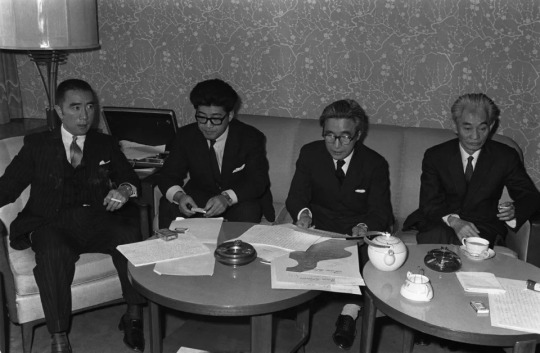
Writers Yukio Mishima, Kobo Abe, Jun Ishikawa, and Yasunari Kawabata reading the statement "Regarding the Cultural Revolution in China, it is imperative to preserve the self-discipline of learning and art" at a press conference. Photographed at the Hotel Imperial, Chiyoda-ku, Tokyo, 28 February 1967.
#yukio mishima#kobo abe#Yasunari Kawabata#Jun Ishikawa#三島由紀夫#安部公房#川端康成#石川淳#cultural revolution#chinese cultural revolution#1967
78 notes
·
View notes
Text
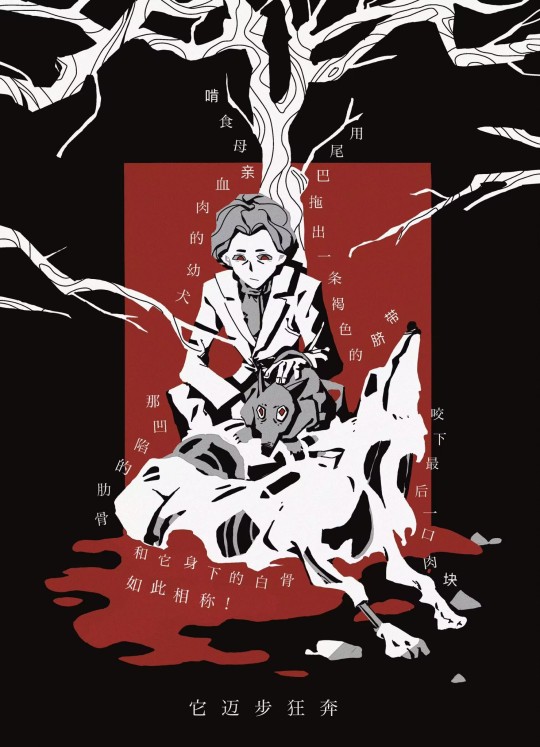

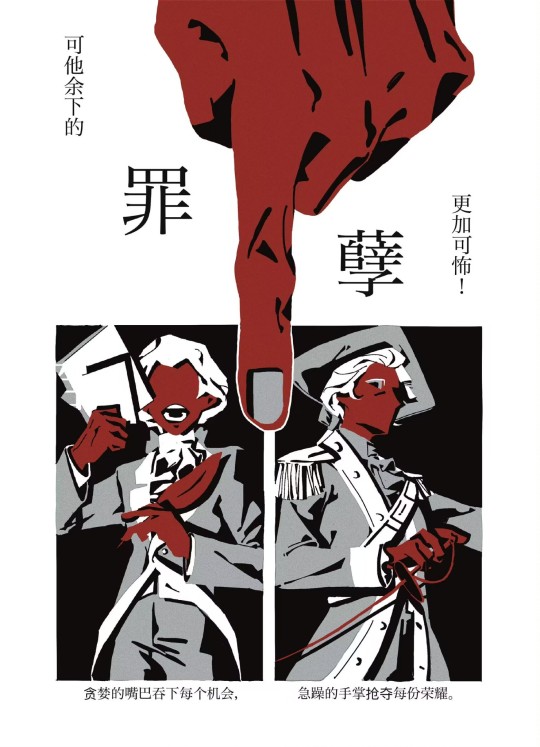



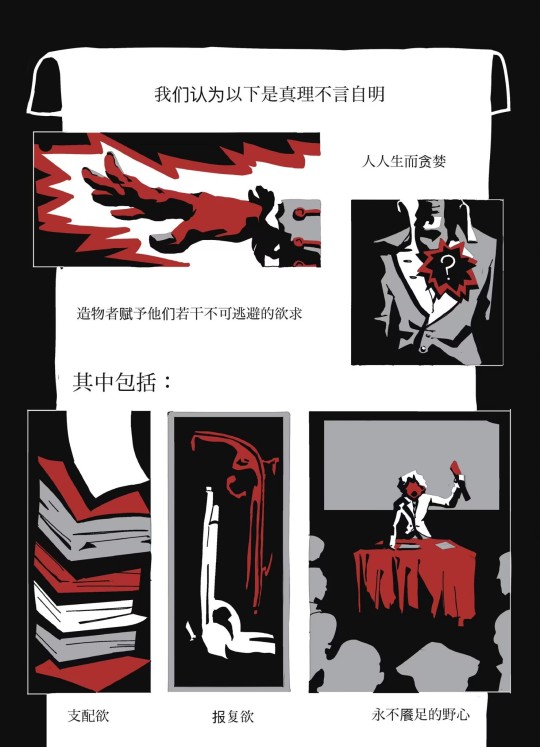
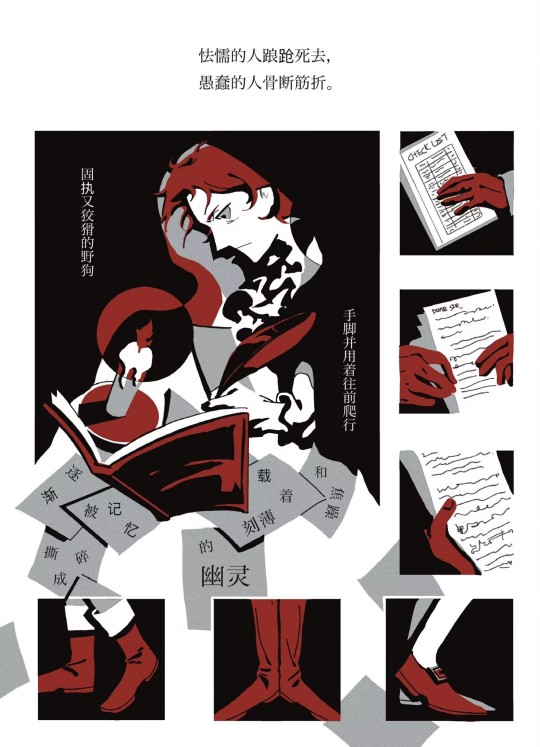
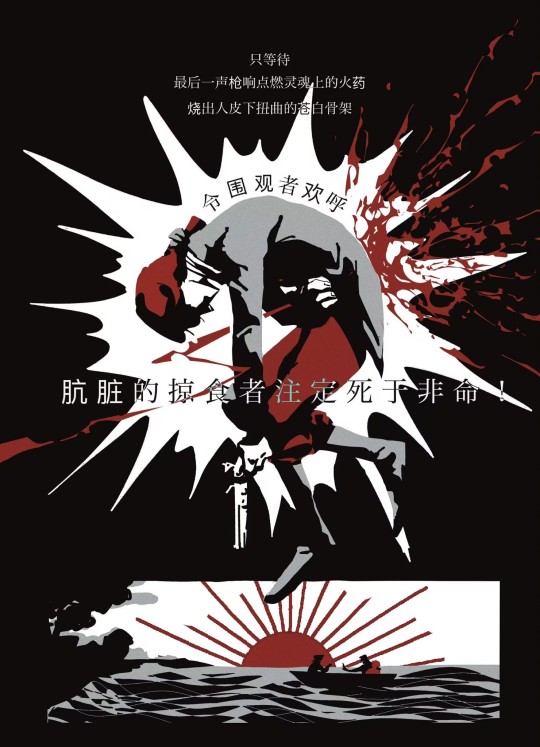
Basicaly a short story that reveals my understanding of AHam.
I am so in love with his high sensitivity and low empathy. This whole deal of not trusting crowds makes him partially out from the human society. I love the feeling SOOOO MUUUUUUUCH
And maybe because I was putting in so much genuine emotion, creating this artwork was a blast! I hope this little story manages to pass on some of my feelings to anyone how read!
Here is the full poem I wrote in chinese:
《一只掠食者如何死去》
啃食母亲血肉的幼犬。
用尾巴拖出一条褐色的脐带,
那凹陷的肋骨
和他身下的白骨
如此相称!
咬下最后一口肉块,
它迈步狂奔。
凄厉的狂吠是亲人的丧钟,
脆弱的脚带它走向新的路。
可怜可悲的怪诞生物,
妄图扭成人形?
可他余下罪孽更加可怖!
贪婪的嘴巴吞下每个机会,
急躁的手掌抢夺每份荣耀。
幼犬长成冷血的狼,
却仍然学不会
从奔跑中停歇。
在这时竟吐出人言:
——神圣的天使!
你傲慢的耳
或许听说过
沉默的绵羊
如何任人践踏。
你高贵的眼
或许阅读过
狡猾的老鼠
如何自甘堕落。
你广阔的学识
或许见证过
懦弱的兔子
如何困死病榻。
你苍白的脸上可曾溅上鲜红的血?
从缪斯停留的古典画框里,
自潘神藏身的大理石像中,
我们尊贵的诗人显出真身,
隔着玻璃怜悯无声病逝的宠物,
却厌恶再去多看出逃的猛兽一眼。
虚假的伪君子,冠冕堂皇的大人。
你何必再为注定被遗忘的人铺床?
死亡本是
我们每晚的归宿,
在漫长的奔波中
让不体面的争抢和讥讽
充满天堂。
我们认为以下是真理不言自明
人人生而贪婪,
造物者赋予他们若干不可逃避的欲求,
其中包括:
支配欲
报复欲
永不餍足的野心
怯懦的人跌倒死去,
愚蠢的人骨断筋折。
固执又狡猾的野狗手脚并用着往前爬行,
逐渐被记忆撕碎成载着刻薄和焦躁的幽灵。
只等待
最后一声枪响点燃灵魂上的火药,
烧出人皮下扭曲的苍白骨架,
令围观者欢呼
肮脏的掠食者注定死于非命!
#Sorry it's in Chinese#I am to lazy to translate a poem#maybe I will post a eng version later#you can google translate it on your own#american revolution#amrev fandom#historical alexander hamilton#alexander hamilton
179 notes
·
View notes
Text
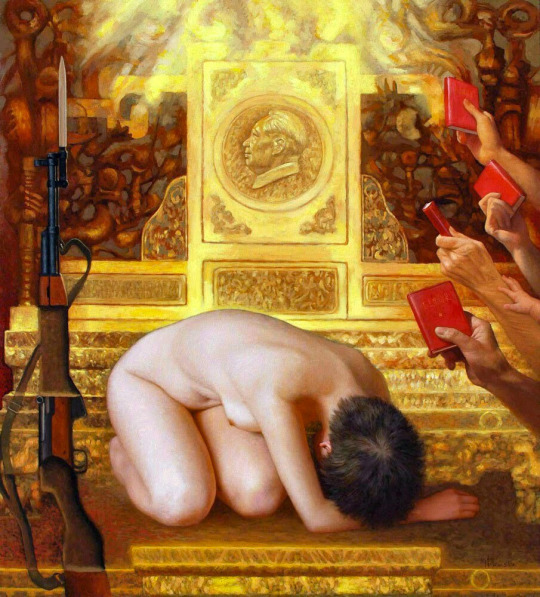
The Little Red Book
548 notes
·
View notes
Text
Lmao 🤣 special thanks to Danny Haiphong and DD Geopolitics for this meme one more time:
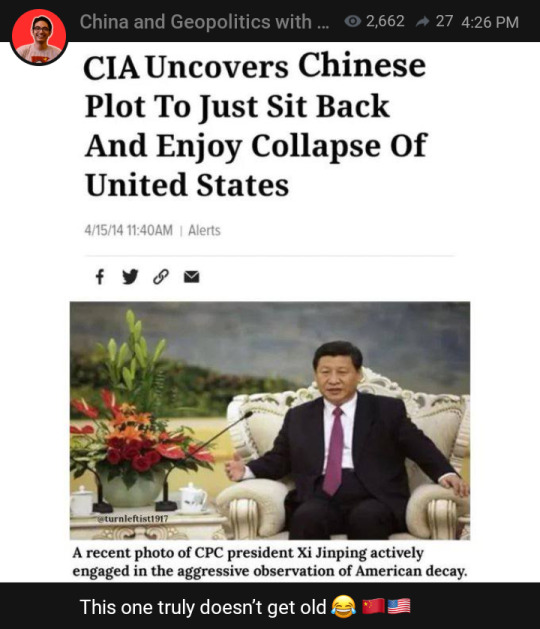
#cia uncovers chinese plot#xi jinping#dd geopolitics#danny haiphong#cia plot#us news#fake news for a laugh#😂#socialism#communism#marxism leninism#socialist politics#socialist news#socialist worker#socialist revolution#socialist propaganda#communist propaganda#socialist#communist#marxism#marxist leninist#politics#geopolitics#workersolidarity#worker solidarity#WorkerSolidarityNews#china#china news
59 notes
·
View notes
Text
the thing that's so frustrating about the babel controversy is the fact that babel was already dumbed down so much for white people to understand. YET SOMEHOW SO MANY WHITE PEOPLE MISSED THE FUCKING POINT
#apparently someone said that rf kuang's 'grasp on history isnt great'#DAMN BITCH YOU ACTUALLY KNOW MORE ABOUT BRITISH COLONIALISM IN CHINA THAN A CHINESE PERSON??? STFU#also white ppl keep saying ':((( tHiS bOoK pRoMoTeS vIoLeNcE aNd ViOlEnCe NeVeR aChIeVeD aNyThInG hIsToRiCaLlY'#??? bitch i can think of of several successful revolutions that were... wait for it... VIOLENT#the real letties of the world are really exposing themselves huh#babel#babel an arcane history#rf kuang#books#bookblr
296 notes
·
View notes
Text

#nct chenle#chenle#nct dream#elle magazine#kpop idols#chinese idols#pink hair#plaid pants#green cardigan#cardigan#children of the revolution#barefoot guys#malefeet#peach hair#in bed#zhong chenle#nct#kpop boys
9 notes
·
View notes
Text
Masochistic dog girl who isn't so sure about the whole "Down with
Traitors, Down with Kuomintang Agents, Down with Local Despots" or "Liquidate the Bloody Eight Years' Debt." but joins the People's Government as soon as she hears "Beat Down the Dog's Legs to Find her Head"
#improba posting#in case you couldn't tell I've been reading#Fanshen: A Documentary of Revolution in a Chinese Village by William H. Hinton
15 notes
·
View notes
Text

2024 LURRA JENDEA IRAULTZE GARAIAN
#soil people#soil people together in the windy liquid society#liquid society#farmers#europe#revolut#galtzagorri#iparraldeko hitza#berria#artwork#art#political art#illustration#drawing#chinese ink#neo expressionism#experimental#expressionism
7 notes
·
View notes
Text
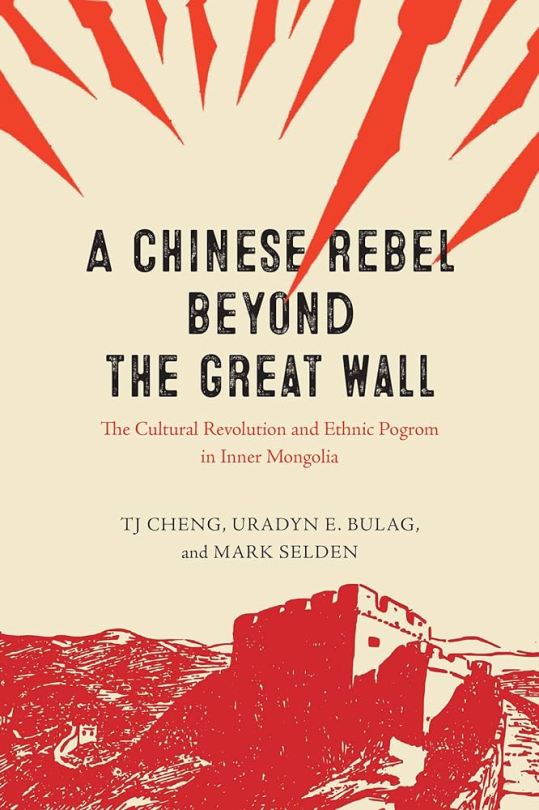
“An eye-opening, heartrending eyewitness account of the atrocities committed against the Mongols by the Communist Party-state. Unforgettable reading and all too pertinent to our times.”
7 notes
·
View notes
Text

Ahh the sweet life of doing revs
11 notes
·
View notes
Text

The Sunday Times Magazine: 'How China Went Red'
26 February 1967
#cultural revolution#chinese cultural revolution#the sunday times magazine#sunday times magazine#chinese communism#china#magazine#Cultural Revolution#文革#中國#文化大革命#1967
27 notes
·
View notes
Text
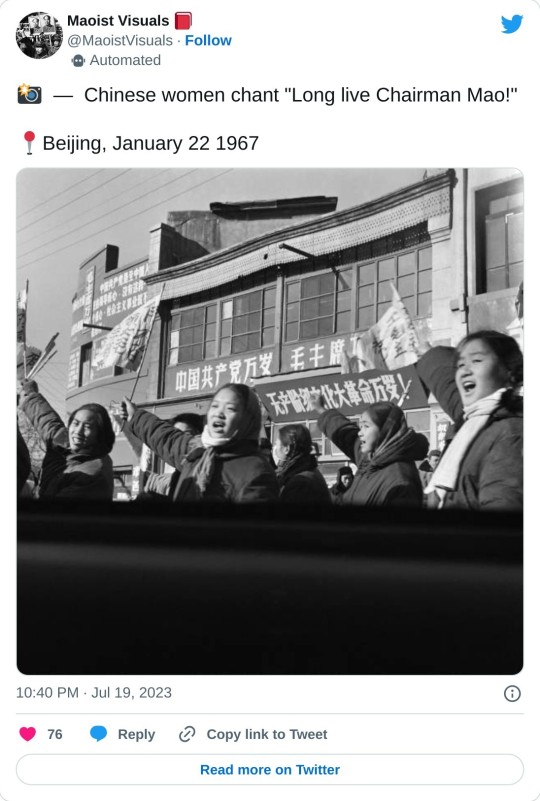
#communism#maoism#Maoist#MLM#marxism#marxism leninism maoism#China#history#cultural revolution#1960s#1968#Beijing#Chinese history#the sixties
18 notes
·
View notes
Text
"During the 'Cultural Revolution,'" Deng pronounced,
there was a view that poor communism was preferable to rich capitalism . . . Because I refuted that view, I was brought down . . . [but] the main task of socialism is to develop the productive forces, steadily improve the life of the people, and keep increasing the material wealth of the society . . . To get rich is no sin.
"Why the West Rules – For Now: The patterns of history and what they reveal about the future" - Ian Morris
#book quotes#why the west rules – for now#ian morris#nonfiction#deng xiaoping#cultural revolution#chinese history#communism#capitalism#socialism#productivity#wealth
3 notes
·
View notes
Text

youtube
#history#history posting#history tumblr#history side of tumblr#important#important to know#china#chinese history#chinese language#chinese langblr#language#language posting#youtube#youtube video#video#video post#chinese culture#chinese revolution#interesting#intriguing#world history#human history#recent history#asian history#educational videos#educational post#educational content
3 notes
·
View notes